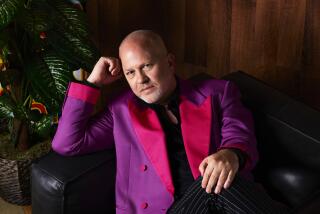SEAN MATHIAS: Speaking His âLanguageâ
His loss at expressing his early sexual identity with ease is one reason why playwright-director Sean Mathias jumped at the chance to make âThe Lost Language of Cranesâ his first screenplay.
The 1986 critically acclaimed book by David Leavitt is the story of a son who tells his mother and father that he is gay, an announcement that compels the father to end his own lie of 20 years. That lie included leaving his wife every Sunday for walks that were actually long visits to New York Cityâs gay porno theaters.
Mathias, a Welshman who directed a revival of âBentâ at the National Theatre in London in 1989 and staged Chekhovâs âUncle Vanyaâ there this year, adapted Leavittâs novel, which Hollywood wouldnât touch, for the British Broadcasting Corp. He made a risky change: moving the setting to London from Manhattan, which was almost a central character itself in the book.
The film, screened at the 1991 London Film Festival, was added by PBS to its âGreat Performancesâ series late in the 1991-92 season. It will air Wednesday during Los Angelesâ gay pride celebration.
Mathias talked to Times Staff Writer Bryan Mingle from London about âThe Lost Language of Cranes,â which stars Eileen Atkins and Brian Cox as the parents and newcomer Angus MacFadyen and Corey Parker (âthirtysomethingâ) as young lovers.
How did this film get made?
It sort of all came slightly about-face in that the BBC approached me and asked if I would be interested in writing a film for them. I have up until now only written for the theater. At one of the meetings a script editor said, âDo you happen to know a book called âThe Lost Language of Cranes?â â And I said, âYes, I know it very well. I love it.â Iâd read it when it first came out and I was a great fan. It has some very fascinating things to say about being gay and the process of living lies and living various hypocrisies that have to do with oneâs sexuality and with everything in oneâs life.
Do you think this film is a rarity, one that deals with gay life and accepting gay life in an honest way?
I think it is a rarity, until now, and this is one of the reasons I wanted to make it. I think one of the things that appealed to me is concentrating on the coming out aspect of the story and to also make the people in the story seem as ordinary as possible, not freakish, to show that the problems of gay people can be as tormented but as ordinary as anyone elseâs.
At first glance some people would say this was a âgayâ novel made into a âgayâ film. What did you see in the story that made you want to adapt it for a wide audience?
I hope itâs important for everyone, but the gay people that itâs important for are the people who are still struggling to come out of the closet with their colleagues at work and with their families, people who would prefer to have their families and their work colleagues know that theyâre gay. I think itâs important for them to show that the struggle can be painful but hopefully rewarding. I think itâs also a very important film for the straight community in understanding that part of the agony of accepting youâre gay when youâve been brought up in what is predominantly a heterosexual society.
I was brought up to be a heterosexual by heterosexuals, and when I realized that I was gay I didnât understand what it was to be gay because I didnât have any vocabulary or language around me to encourage me.
More to Read
The biggest entertainment stories
Get our big stories about Hollywood, film, television, music, arts, culture and more right in your inbox as soon as they publish.
You may occasionally receive promotional content from the Los Angeles Times.










